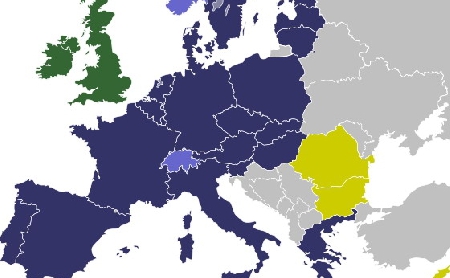Romania-Austria controversy over Schengen enlargement
The Bucharest authorities plan to sue Austria opposing Romania's access to the Schengen area. According to Romanian Prime Minister Marcel Ciolacu, Romania lost 2% of its GDP due to Vienna's veto.

Mihai Pelin, 18.09.2023, 14:00
Romania’s accession to the free movement area continues to be a priority on the Bucharest authorities foreign affairs agenda. At present, all EU member states except Bulgaria, Cyprus, Ireland and Romania are part of the Schengen area, which also includes non-EU states such as Iceland, Norway, Switzerland and Liechtenstein. The European Commission says Bulgaria and Romania are ready to join Schengen, while the European Parliament has repeatedly supported the two countries accession. Nevertheless, Austria continues to be against it, using as argument for its opposition to the Schengen enlargement, the increasing flow of migrants.
Vienna’s opposition is not directed against Bucharest, but against this system of free movement, the Austrian Minister of European Affairs, Karoline Edtstadler has said recently. The statement comes after the Bucharest government announced its intention to bring Austria to the EU’s top court if it continues to block Romania’s accession. The Austrian minister said that she understands the Romanian authorities position, but that she cannot turn a blind eye to a faulty system. She explained that the EU should first ensure an effective protection system of its external borders, the only way in which the vision of a Europe without internal borders could exist.
In an interview carried by the Austrian media, Romanian Prime Minister Marcel Ciolacu said that, in the event of a new opposition by Austria, Romania will have to appeal this decision to the European Court and demand compensations for the economic losses incurred by not accepting the country into the Schengen area.
The fact that Romania and Bulgaria are still outside the free movement zone is a burden for businesses and the population of the two countries from a social and economic point of view, according to the European Parliament. Moreover, Romanian and Bulgarian citizens are discriminated against, as they face delays, bureaucratic difficulties and additional costs when traveling, compared to their counterparts in the Schengen area, according to the resolution adopted by a wide majority in July by the European Parliament. The European legislative urges the EU Council to approve the accession of the two countries to the Schengen area.
We remind you that, at the end of last year, a unanimous decision could not be adopted as regards the Schengen accession of Romania and Bulgaria, both EU members since 2007, after Austria and the Netherlands opposed it. Vienna motivated its stand by the fact that Romania is allegedly part of the Balkan illegal migration route. This accusation was rejected by the Bucharest authorities and officially declared untrue by the European institutions, including the European Border Police and the Coast Guard. On its part, the Netherlands said at the time that it supports Romania’s accession, but not Bulgaria’s. (EE)






























